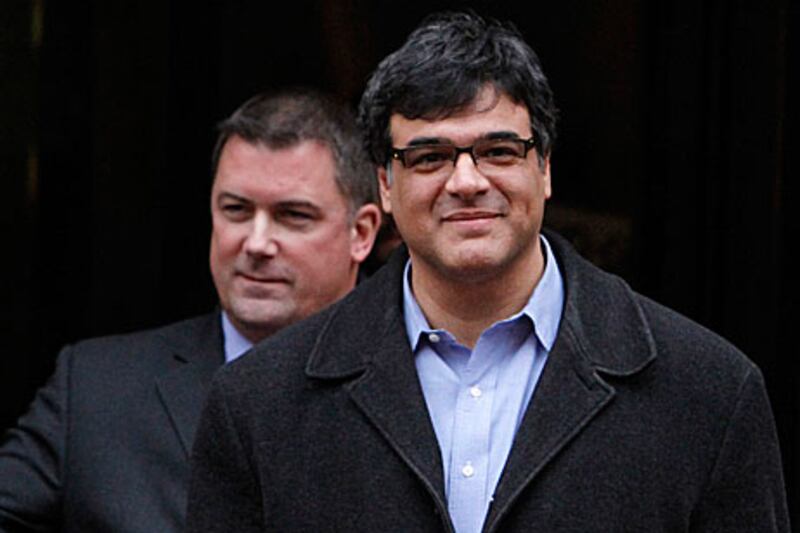ALEXANDRIA, VIRGINIA // An ex-CIA officer who helped track down and capture a top Al Qaeda figure has been charged with disclosing classified secrets, including the role of one of his associates on that covert mission, in the latest of a series of US criminal prosecutions of suspected leakers.
John Kiriakou, 47, was charged with violating the Intelligence Identities Protection Act and the Espionage Act. A federal judge ordered Mr Kiriakou to be released on a US$250,000 (Dh918,300) unsecured bond. Mr Kiriakou declined to comment as he left the courthouse on Monday.
According to authorities, Mr Kiriakou divulged to three journalists, including a New York Times reporter, the role of "Officer B", who worked with Mr Kiriakou on the capture of suspected Al Qaeda financier Abu Zubaydah in the months after the September 11 attacks on New York and Washington.
Mr Zubaydah, who has been held without charges at Guantanamo since 2006, was waterboarded 83 times, and his case has been made an example by those who believe the interrogation technique should be outlawed. And Mr Kiriakou's public discussions of Mr Zubaydah's waterboarding were a key part of the debate.
In a separate accusation, Mr Kiriakou is alleged to have disclosed the identity of a covert operator to an unidentified journalist. Authorities say that journalist then gave the officer's name to a team of defence lawyers representing a suspect the US held at Guantanamo Bay in Cuba. When the lawyers included information about the officer in a sealed legal brief in 2009, the CIA became suspicious and the government began to investigate.
The affidavit states that the defence lawyers were found to have done nothing wrong.
According to the affidavit, federal agents interviewed Mr Kiriakou last week, and he denied leaking the information. When specifically asked whether he had provided the Mr Zubaydah interrogator's name to the Times for a 2008 article, he replied "Heavens, no". A New York Times spokeswoman declined to comment.
If convicted, Mr Kiriakou could face up to 30 years in prison and a US$1 million fine.
In a 2007 interview with ABC News, Mr Kiriakou said that waterboarding was used - effectively - to break down Mr Zubaydah. But he expressed ambivalence about pouring water into a suspect's breathing passages to simulate drowning to try to get them to talk.
"[We] were really trying to do anything that we could to stop another major attack from happening," Mr Kiriakou said, describing the months after the September 11 attacks. "I don't think we're in that mindset right now. ... And, as a result, waterboarding, at least right now, is unnecessary."
Brent Mickum, an attorney who represents Mr Zubaydah in the prisoner's petition for release, said he and other attorneys who work at Guantanamo take security restrictions seriously and know not to reveal classified information. But he also said the government abuses the classification system, selectively leaking information and keeping secret anything that could embarrass US officials.
The charges also accuse Mr Kiriakou of lying about his actions in an effort to convince the CIA to let him publish a book, The Reluctant Spy: My Secret Life in the CIA's War on Terror in 2010. The book explores "the inner workings of the US intelligence apparatus," according to its description on Amazon.com, and "chillingly describes what it was like inside the CIA headquarters on the morning of 9/11."
The US Justice Department's campaign to prosecute leakers has been particularly aggressive under Obama. This is the sixth criminal leak case opened under the administration and the second involving a former CIA officer and the Times. Federal prosecutors claim Jeffrey Sterling divulged classified information to Times reporter James Risen about CIA efforts to thwart Iran's nuclear ambitions.
Prosecutions under the Espionage Act have been particularly contentious. Opponents say the law can be used to unfairly target those who expose government misdeeds. The law was used, for instance, to charge Daniel Ellsberg in the Pentagon Papers case, and a grand jury has been investigating whether WikiLeaks founder Julian Assange can be prosecuted for the mass of disclosures by WikiLeaks that were allegedly fostered by leaks from Army Pfc Bradley Manning.






